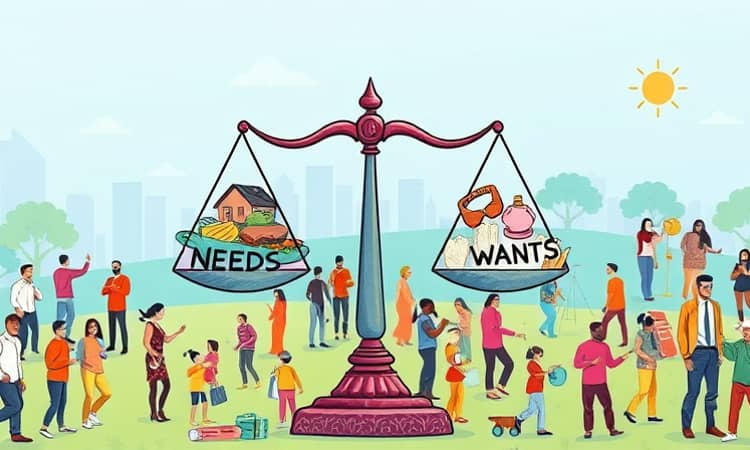Understanding the difference between needs and wants is crucial when it comes to budgeting. Many of us struggle with managing our finances, and this often stems from not distinguishing between what we truly need and what we simply desire. As we dive into the intricacies of budgeting, keeping this distinction at the forefront can guide us toward more effective financial planning.
Within the realm of personal finance, 'needs' are defined as essentials required for daily living, while 'wants' are non-essential items that enhance our lifestyle but are not necessary for survival. By understanding these concepts in greater depth, individuals can create budgets that reflect their true priorities and financial realities.
The following sections will elaborate on how needs and wants impact our budgeting process, practical tips for identifying them, and how they ultimately influence our financial goals. Let's explore the fundamentals of budgeting and why this distinction matters.
The Fundamentals of Budgeting

Budgeting is the process of creating a plan to manage an individual’s or organization’s financial resources effectively. It involves estimating how much money you expect to earn and how much you plan to spend over a certain period, usually a month or a year. This forecasting enables better financial decision-making and can ultimately lead to achieving long-term financial goals.
- Set clear financial goals.
- Track your income and expenses.
- Categorize your spending into needs and wants.
- Adjust your budget as necessary.
By implementing these fundamentals, individuals can gain greater control over their finances. This flexibly structured approach allows one to see where money is going and how it aligns with personal priorities.
A well-thought-out budget not only prepares individuals to meet their essential needs but also helps in allocating discretionary spending for wants, ensuring a balanced financial wellness.
The Concept of Needs

In personal finance, needs refer to the basic requirements necessary for survival and a reasonable quality of life. These include food, shelter, clothing, healthcare, and education. Understanding this concept is vital for effective budgeting as it allows individuals to prioritize their spending based on survival and essential living costs.
While everyone's needs can vary slightly depending on their lifestyle and circumstances, the core needs remain quite universal. The ability to distinguish between these necessities and discretionary spending is key to minimizing financial stress and achieving greater financial stability.
- Housing costs (rent/mortgage)
- Groceries and food essentials
- Healthcare expenses
- Transportation (public transport, fuel)
- Utilities (electricity, water, internet)
By clearly defining what constitutes a need, individuals can create budgets that ensure they cover these critical expenses first. This deliberate prioritization helps safeguard against financial hardship and ensures that life's essentials are met before allocating funds to lesser priorities.
Recognizing these essential costs is the first step to effective budgeting, providing a solid foundation on which discretionary expenses can later be determined.
The Concept of Wants

Wants, in contrast to needs, are defined as goods or services that are not essential for survival but enhance quality of life or provide pleasure. These can include dining out, luxury items, the latest technology, or entertainment subscriptions. While they can contribute to well-being, they should not overshadow the importance of fulfilling needs in a budget.
Many individuals struggle with understanding the difference between needs and wants, often leading to overspending in areas that do not necessarily enhance their well-being. Recognizing wants is crucial as it allows for more intentional spending that aligns with individual values and financial goals.
- Dining out or ordering take-out
- Luxury clothing or accessories
- High-end electronics
- Subscription services (e.g., streaming, magazines)
- Travel and leisure activities
By identifying wants, individuals can determine where they can cut back or allocate discretionary funds responsibly. Budgeting is not about restricting enjoyment but rather about finding a balance that allows for both needs and wants without sacrificing financial health.
Prioritizing spending on wants can enhance life’s enjoyment, but it is advisable to do so only after all essential needs are adequately met.
The Importance of Distinguishing Between Needs and Wants

Recognizing the difference between needs and wants is critical for successful budgeting and overall financial health. As people often confuse the two, they may end up making financial decisions that jeopardize their ability to meet essential expenses. Understanding this distinction helps in creating realistic budgets that reflect true priorities in life.
Moreover, this recognition raises self-awareness about spending habits, enabling individuals to operate within their means and avoid unplanned debt or financial stress. Knowing when to save and when to spend fosters sound financial discipline and confidence.
- Create a specific budget for needs before allocating resources for wants.
- Review monthly expenses to identify patterns of unnecessary spending.
- Set a limit for discretionary spending on wants to avoid overspending.
- Reflect on long-term goals versus immediate gratification for better decision-making.
By actively creating a distinction between needs and wants, individuals can make informed choices that strengthen their financial position. Eliminating confusion between the two enables better control over finances and fostering a healthier budget.
Practical Tips for Identifying Needs vs. Wants

To improve budgeting practices, it is vital to develop a keen sense of what constitutes a need versus a want. Often, individuals can benefit from a few practical strategies that aid in making these distinctions more evident.
One effective technique is to ask yourself a set of questions every time you're considering a purchase. Knowing how to evaluate your spending choices can significantly enhance your budgeting skills.
- Ask, 'Will this purchase help me survive or function in my daily life?'
- Consider if you can live without the item or service for a week or more.
- Reflect on if this item contributes to your long-term financial goals.
- Seek input from trusted friends or family on whether they see the item as a need or a want.
The Impact of Needs vs. Wants on Financial Goals

Understanding needs and wants plays a significant role in achieving personal financial goals. Individuals can direct their resources towards what genuinely matters by carefully examining and prioritizing their spending.
This clarity assists people in setting realistic financial targets, whether saving for a home, retirement, or a child's education, while also maintaining a fulfilling lifestyle.
- Prioritizing needs first helps fund savings for future investments.
- Balancing needs and wants promotes emotional satisfaction while ensuring financial stability.
- Regularly reviewing and adjusting budgets based on changing needs and wants leads to better long-term money management.
- Setting clear financial goals can help resolve potential conflicts between needs and wants.
The relationship between needs and wants can determine how effectively you achieve your financial goals. A thoughtful approach permits individuals to manage their funds wisely while enjoying life without detracting from essential pursuits.
Conclusion

In conclusion, understanding the difference between needs and wants is essential for effective budgeting. By prioritizing needs over wants, individuals can ensure their financial stability and reduce anxiety related to money management. This distinction not only empowers better spending decisions but fosters a healthy relationship with finances.
With intentionality in budgeting, individuals can navigate their financial journeys with clarity. This will ultimately enhance their overall well-being, enabling them to live within their means, plan for the future, and enjoy life.
Establishing a solid budget based on needs and wants is a valuable skill that can lead to financial independence and peace of mind.














